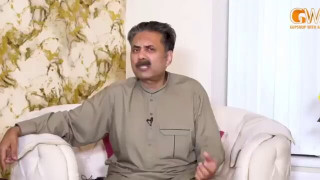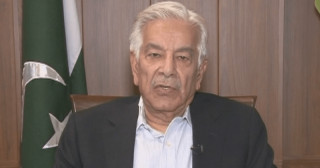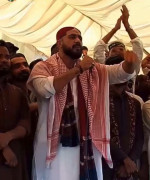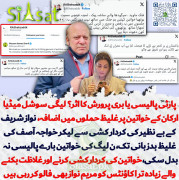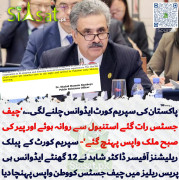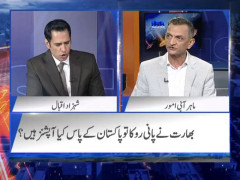Pakistani1947
Chief Minister (5k+ posts)
"The Life of Muhammad" by Ibn Ishaq has been quoted by many critics of Islam. They get excited when Ibn Ishaq paints a bad picture of Prophet Muhammad and use it in their writings to attack Islam. Although Ibn Ishaq was the earliest of the traditionists to write a biography of the events that pertained to the time of Muhammad (p) there are several severe problems with his writings. As Bassam Zawadi says" just because something is early doesn't mean it is true". He has a good point. Not everyone back then was reliable and honest. Ibn Ishaq was known to be careless in him collecting stories about the Prophet, etc.
Several respected Muslim theologians rightly reject his (Ibn Ishaq's) authority for several reasons:
(A) That he was a Shi'i favouring Ali over all the other contenders to the Khilfa
(B) That he held the view that Man has free will, which is kind of contrary to the Quranic perception.
(C) That his Isnads (chains of transmissions) were defective, ie not 'iron' tight by naming all the reporters, which is important because this determines whether the transmitter of the story is trustworthy or not. Ibn Ishaq was not an eye witness to any of the events of Prophet Muhammad's life. Ibn Ishaq was writing about 150 years after the Prophet's death so this is very important. In Islamic sciences in order for a report of the Prophet (peace be on him) to be true is if the isnad is solid or not.
(D) He used reports of traditions gathered from Jewish sources. Jews made up a lot of false stories/legends of Prophet Muhammad (just like the early Christians living outside of Palestine made up a lot of myths and legends of Jesus and put them in the Gospels). Making up stories and legends about the Prophet are unnacceptable in the eyes of many Islamic scholars.
(E) Ibn Ishaq was (for lack of better term) a "suck up" to the Jews of Arabia. He said several complimentary reports of the Jews of Arabia, despite the fact that the Jews of Arabia were constatnly fighting with the Arabs and were charging interest when loaning money. The Jews of Madinah were constatly plotting againist the Prophet Muhammad. They were always trying to undermine his authority. In fact they sided with the Makkans in order to assinate the Prophet.
(F) Most important of all, his report about Laylat al Qadr (the first revelation), contradicts all the hadith versions. The hadith collectors Bukhari, Muslim, Abu Dawud, etc were more careful in collecting their hadith (their chains of transmission).
(G) There are several stories in Ibn Ishaq which are never found in the hadith. The reason why is because several hadith collectors such as Bukhari-- did not trust Ibn Ishaq.
Ibn Ishaq as an author was in fact subjected to devastating attacks by scholars, contemporary or later, on two particular accounts. One was his uncritical inclusion in his Sira of so much spurious or forged poetry [7] ;the other his unquestioning acceptance of just such a story as that of the slaughter of Banu Qurayza [8]. It gets worse for Ibn Ishaq though. First let's talk about what Imam Malk thought of Ibn Ishaq.
Malik bin Anas Bin Malik bin Abu Amir Al-Asbahi (715-801 C.E.) or Imam Malik-- lived cloest in the time to the life of Prophet Muhammad of all the collectors of the hadith (Bukhari, Muslim, Abu Dawud, etc). He was born more than 80 years after the death of the Prophet.
Imam Malik was a complier of a respected hadith collection, called Muwatta. Imam Malik was a hadith scholar. Imam Malik called Ibn Ishaq a liar and an imposter for writing false stories about Prophet Muhammad. Imam Malik has said that Ibn Ishaq "reports traditions on the authority of the Jews". [9]
Ibn Ishaq was condemned by some of our major Islamic scholars.
[FONT=&]
[/FONT]Shaykh ibn Taymiyyah said:
"Allah has provided evidence (i.e. Isnad) establishing the authenticity or lack thereof of the narrations that are necessary in matters of the religion. It is well known that most of what was reported in aspects of Tafsir (commentaries on the Qur'an) is similar to narrations reporting Maghazi (or Seerah) and battles, promoting Imam Ahmad to state that three matters do not have Isnad: Tafsir, Mala'him (i.e. great battles), and Maghazi. This is because most of their narrations are of the Maraseel (plural for Mursal) type, such as narrations reported by Urwah Ibn az-Zubair, ash-Sha'bi, az-Zuhri, Musa Ibn Uqbah and Ibn Ishaq." [10]
Imam Malik was not the only contemporary of Ibn Ishaq's to have problems with him. Despite writing the earliest biography of Prophet Muhammad, Scholars such as al-Nisa'I and Yahya b. Kattan did not view Ibn Ishaq as a reliable or authoritative source of Hadith. [11] Though some thought his use of collective isnad (chains of tranmissions) problematized his Hadith, several people went so far as to call Ibn Ishaq a liar on matters of Hadith. Others claim Ibn Ishaq included verses in his Sira that he knew were not authentic.
[FONT=&]
What other said about Ibn Ishaq:
[/FONT][FONT=&]
[/FONT]Ibn Ishaq being the solitary narrator i.e. there is no chain for it that does not involve Ibn Ishaq. Solitary reports of Ibn Ishaq are not reliable.
Imam Ahmad Ibn Hanbal was asked about the solitary reports of Ibn Ishaq if they are considered reliable. He said No!. See Tahdhib al-Tahdhib, Daira Maarif Nizamia, Hyderabad, 1326 A.H. vol.9 p.43
There are several chainless stories that exist in Ibn Ishaq's work. We don't know who these missing people are. We don't know if they are Muslims, non-Muslims, hypocrites acting as Muslims and purposely spreading lies, etc. So if we are not sure who the people in the missing links are, how can we apply the principle of embarrassment to the narrations? We can only apply this principle if we were to know that the person is a trustworthy Muslim who would definitely have no motive to lie and make up something derogatory about the Prophet (peace be upon him). However, for all we know, the people in the missing link could be people known for fabricating narrations. You can't apply this principle to these narrations. Since we are not sure who the people in the missing link are, we can't confidently go ahead and apply this principle to this situation.
Source
Several respected Muslim theologians rightly reject his (Ibn Ishaq's) authority for several reasons:
(A) That he was a Shi'i favouring Ali over all the other contenders to the Khilfa
(B) That he held the view that Man has free will, which is kind of contrary to the Quranic perception.
(C) That his Isnads (chains of transmissions) were defective, ie not 'iron' tight by naming all the reporters, which is important because this determines whether the transmitter of the story is trustworthy or not. Ibn Ishaq was not an eye witness to any of the events of Prophet Muhammad's life. Ibn Ishaq was writing about 150 years after the Prophet's death so this is very important. In Islamic sciences in order for a report of the Prophet (peace be on him) to be true is if the isnad is solid or not.
(D) He used reports of traditions gathered from Jewish sources. Jews made up a lot of false stories/legends of Prophet Muhammad (just like the early Christians living outside of Palestine made up a lot of myths and legends of Jesus and put them in the Gospels). Making up stories and legends about the Prophet are unnacceptable in the eyes of many Islamic scholars.
(E) Ibn Ishaq was (for lack of better term) a "suck up" to the Jews of Arabia. He said several complimentary reports of the Jews of Arabia, despite the fact that the Jews of Arabia were constatnly fighting with the Arabs and were charging interest when loaning money. The Jews of Madinah were constatly plotting againist the Prophet Muhammad. They were always trying to undermine his authority. In fact they sided with the Makkans in order to assinate the Prophet.
(F) Most important of all, his report about Laylat al Qadr (the first revelation), contradicts all the hadith versions. The hadith collectors Bukhari, Muslim, Abu Dawud, etc were more careful in collecting their hadith (their chains of transmission).
(G) There are several stories in Ibn Ishaq which are never found in the hadith. The reason why is because several hadith collectors such as Bukhari-- did not trust Ibn Ishaq.
Ibn Ishaq as an author was in fact subjected to devastating attacks by scholars, contemporary or later, on two particular accounts. One was his uncritical inclusion in his Sira of so much spurious or forged poetry [7] ;the other his unquestioning acceptance of just such a story as that of the slaughter of Banu Qurayza [8]. It gets worse for Ibn Ishaq though. First let's talk about what Imam Malk thought of Ibn Ishaq.
Malik bin Anas Bin Malik bin Abu Amir Al-Asbahi (715-801 C.E.) or Imam Malik-- lived cloest in the time to the life of Prophet Muhammad of all the collectors of the hadith (Bukhari, Muslim, Abu Dawud, etc). He was born more than 80 years after the death of the Prophet.
Imam Malik was a complier of a respected hadith collection, called Muwatta. Imam Malik was a hadith scholar. Imam Malik called Ibn Ishaq a liar and an imposter for writing false stories about Prophet Muhammad. Imam Malik has said that Ibn Ishaq "reports traditions on the authority of the Jews". [9]
Ibn Ishaq was condemned by some of our major Islamic scholars.
[FONT=&]
[/FONT]Shaykh ibn Taymiyyah said:
"Allah has provided evidence (i.e. Isnad) establishing the authenticity or lack thereof of the narrations that are necessary in matters of the religion. It is well known that most of what was reported in aspects of Tafsir (commentaries on the Qur'an) is similar to narrations reporting Maghazi (or Seerah) and battles, promoting Imam Ahmad to state that three matters do not have Isnad: Tafsir, Mala'him (i.e. great battles), and Maghazi. This is because most of their narrations are of the Maraseel (plural for Mursal) type, such as narrations reported by Urwah Ibn az-Zubair, ash-Sha'bi, az-Zuhri, Musa Ibn Uqbah and Ibn Ishaq." [10]
Imam Malik was not the only contemporary of Ibn Ishaq's to have problems with him. Despite writing the earliest biography of Prophet Muhammad, Scholars such as al-Nisa'I and Yahya b. Kattan did not view Ibn Ishaq as a reliable or authoritative source of Hadith. [11] Though some thought his use of collective isnad (chains of tranmissions) problematized his Hadith, several people went so far as to call Ibn Ishaq a liar on matters of Hadith. Others claim Ibn Ishaq included verses in his Sira that he knew were not authentic.
[FONT=&]
What other said about Ibn Ishaq:
[/FONT][FONT=&]
[/FONT]Ibn Ishaq being the solitary narrator i.e. there is no chain for it that does not involve Ibn Ishaq. Solitary reports of Ibn Ishaq are not reliable.
Imam Ahmad Ibn Hanbal was asked about the solitary reports of Ibn Ishaq if they are considered reliable. He said No!. See Tahdhib al-Tahdhib, Daira Maarif Nizamia, Hyderabad, 1326 A.H. vol.9 p.43
There are several chainless stories that exist in Ibn Ishaq's work. We don't know who these missing people are. We don't know if they are Muslims, non-Muslims, hypocrites acting as Muslims and purposely spreading lies, etc. So if we are not sure who the people in the missing links are, how can we apply the principle of embarrassment to the narrations? We can only apply this principle if we were to know that the person is a trustworthy Muslim who would definitely have no motive to lie and make up something derogatory about the Prophet (peace be upon him). However, for all we know, the people in the missing link could be people known for fabricating narrations. You can't apply this principle to these narrations. Since we are not sure who the people in the missing link are, we can't confidently go ahead and apply this principle to this situation.
Source
- Featured Thumbs
- https://i.imgsafe.org/eb14cabe13.jpg
Last edited by a moderator:


